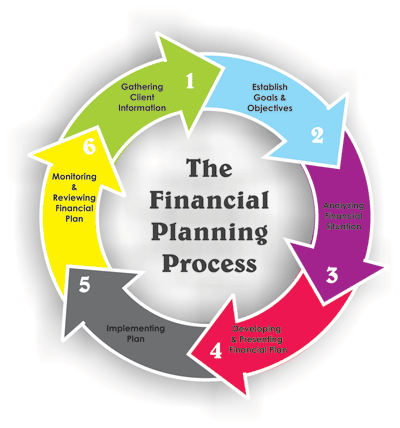Here are 10 frequently asked questions (FAQ) and answers about financial planning advice.
1. What is financial planning advice?
Financial planning advice helps you make the most of what you have while you create a comfortable future for yourself and your family. It's based on your goals and dreams, and includes tax planning, investments and your financial security.
Financial planning advice is also about providing you with the information and advice you need to move in the direction you want to take. It puts you in control of your financial future.
Financial planning advice brings peace of mind and financial security - you will have everything in place to protect what you have now, and create more in the future.
2. Do I need financial planning advice?
Let's say you are reading this because you're thinking about getting professional financial planning advice. That's a great start. Because the fact is that no matter what your personal circumstances are now, you probably have some dream of where you'd like to be in the future. Or you may be in the fortunate position of having some money to invest. There are many reasons why you might need professional financial planning advice including:
- You're changing jobs or just want to review your options under Super Choice.
- You want to plan now for a comfortable retirement.
- You have an inheritance, redundancy or other lump sum to invest.
- You want to make sure your family is protected if something happens to you or your partner.
- You are planning to buy an investment property.
- You are single again after a long relationship, due to divorce or the death of your partner.
- You are starting your own business.
- You are planning a major life change, such as marriage or retirement or moving house.
- You want to make sure you leave something for your children or grandchildren.
3. What are the steps to getting financial planning advice?
The 6 steps to getting financial planning advice are:
- Gathering your financial data: A financial planner will need to gather as much information about your current financial situation as possible including details on your income, debt level and other commitments.
- Identifying your goals: A financial planner will put your needs first so make sure you clearly define your needs and goals at the first meeting.
- Identifying any financial issues: A financial planner will tell you if there are any deficiencies between where you are now financially and where you want to be.
- Preparing your financial plan: This step involves your financial planner identifying recommended investments and will address your attitude to risk.
- Implementing your financial plan: You will agree to take the financial plan, possibly with some adjustments, and when you are ready to go ahead your financial planner will show you how to put your financial plan into action.
- Reviewing and revising your financial plan: For most people their financial plan is the start of a long term relationship with their financial planner. To ensure your plan stays up-to-date and relevant to the economic climate and your changing lifestyle and goals, it should be reviewed regularly.
4. How much does financial planning advice cost?
There is no set amount that a financial planner will charge. It depends on how complex your situation is and the level of service that the financial planner provides. Your financial planner will prepare a Statement of Advice which will detail all fees and charges payable to the financial planner, both from commissions and fees.
As a general rule fees can include:
- A flat dollar amount.
- An hourly rate.
- Commission on the amount you invest.
- Some financial products have fees built in, and the payments may be passed on from these to the financial planner.
- You may be charged an initial fee for advice received and an ongoing fee for additional advice.
Some financial planners only use one fee basis, but many use a combination of the above. If you have any questions regarding fees please contact us.
5. What questions should I consider before getting financial planning advice?
Take an active role in making your financial plan and you'll get maximum value from the experience. It may sound overly simple but you will need to know what it is you want from your financial plan! Before you meet with your financial planner, consider the questions below:
- What are your lifestyle goals?
- What insurance might you need?
- Are you a member of a superannuation fund?
- How much do you have to invest?
- Would you consider borrowing money to invest?
- What sort of return do you expect?
- Can you live with the risk of losing some of your money?
- What are your priorities?
6. What does my financial planner need to know about me?
Expect to tell your financial planner a range of personal information to help them get an accurate picture of exactly where you are now and what you want from financial planning. They have to understand your situation completely - so do not leave out any vital information. To help put together your financial plan, a financial planner will use information such as:
- Your age.
- Income - now and what you expect to be earning in the future.
- How many dependants you have.
- Everyday expenses - how much it costs you to live now.
- Possible future expenses - having a family, education, travel, house renovations.
- How much tax you pay now (and/or owe).
- How much you have in assets (house, car, shares, valuables).
- How much you owe in loans (mortgage, personal loans, credit card debt).
- Amount you have invested in superannuation or other investments.
- Insurance - what are you covered for already, and how much would you receive in case of a claim?
7. What will my financial plan contain?
If your financial planner gives you personal advice, they must give you a written Statement of Advice (SOA). This sets out:
- The advice they've given you.
- The information on which it's based.
- How they get paid (including any commissions).
- Any interests, associations or relationships that could influence them.
Personal advice is financial advice that takes into account your personal objectives, financial situation or needs. The information in an SOA should be presented clearly and concisely, with enough detail for you to make an informed decision about whether to act on the advice.
If your financial planner gives you general advice only, they do not have to give you an SOA. However, they must warn you that the advice has been prepared without taking into account your objectives, financial situation or needs.
8. What happens once I have a financial plan?
Don't lose sight of the fact that it's your money and the final decision is always yours. You can ask for some changes to the financial plan if you want to, or you may decide not to go any further. It is completely up to you.
If you decide to go ahead your financial planner will discuss with you your next steps to put the financial plan into action. There may be some actions you need to take (for example in making extra super contributions you may need to discuss your options with your employer first).
Most people use the first financial plan as a starting point and change their financial plan from time to time, in line with changing goals and life stages - so your relationship with your financial planner may be a long one!
9. What ongoing services do financial planners provide?
- Reviewing progress in achieving your financial goals, and revising strategies as required.
- Investment portfolio valuations and reviews.
- Information on new investment opportunities.
- Ongoing consultations as required.
10. What questions do I ask my financial planner before we start?
- Can I have a copy of your Financial Services Guide (FSG)? You can expect to be given a FSG by an Australian Financial Services (AFS) licence holder or its authorised representative before you receive a financial service. The FSG explains the nature of financial services being offered, the fees charged and how the person providing the service deals with customer complaints. If you are in doubt you can check if they are licensed on the ASIC website http://www.asic.gov.au.
- What is your approach to financial planning? Some financial planners specialise in certain types of planning - for example, retirement planning. So it's important to ask a few questions about their approach, and find a financial planner who is in tune with your lifestyle and wishes. Also ask if the financial planner will implement your financial plan themselves or refer you to others to do that.
- How much do you typically charge? Your financial planner should be able to give an estimate of possible costs based on the work you are asking for and your options for paying for advice. Your financial planner must by law let you know all costs to you, and all sources of potential income for them, from your financial plan. For example they may receive benefits from referring you to a particular investment.
- Will I receive a written plan? By law, if you proceed to get personal advice, your financial planner must provide a written Statement Of Advice.
- How often will you review the financial plan, and what will it cost me? Every financial plan needs reviews, so find out what your financial planner will charge you for ongoing reviews of your financial plan, and how often they believe it should be done. As your goals and life changes in the future, so should your financial plan!
- How do you resolve issues or disputes that arise? Ask at the beginning what happens if you don't want to accept your financial planner's advice. Find out at what stage you become obliged to make payment, and what happens if you want to terminate their services at any time.
- What credentials should my financial planner have? Your financial planner must be licensed by the Australian Securities and Investments Commission (ASIC) or be authorised to represent a licence holder. He or she will have met standards in terms of education, professional conduct, ongoing training, compliance and disclosure. They may be a member of a professional body, for example the Association of Independently Owned Financial Professionals (AIOFP). Your financial planner should be covered by professional indemnity insurance.
The above article was sourced from the Financial Planning Association publication: "Good advice for peace of mind"


